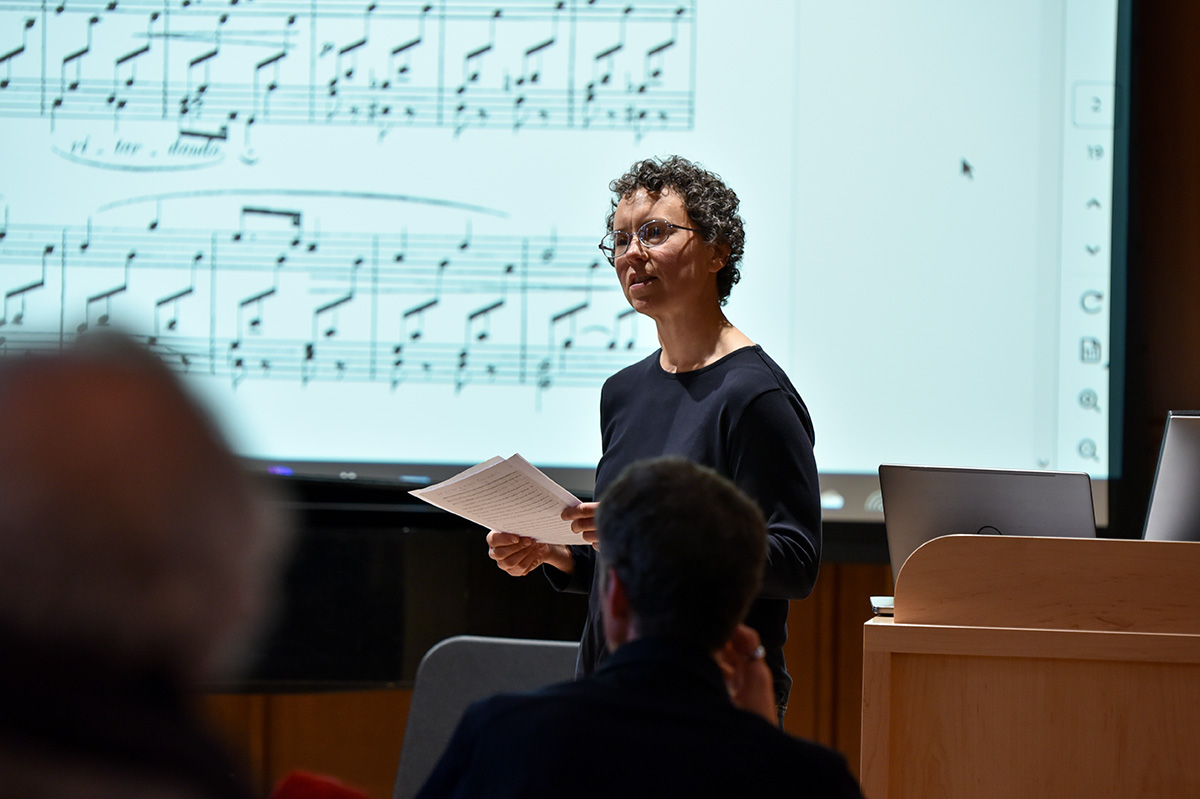One of the first schools in the United States to offer the PhD in musicology, Eastman conferred its first degree in 1936 for a dissertation on the music of Francesco Landini. Students entering the MA/PhD program can look forward to two years of wide-ranging coursework, reflecting the interests of the large faculty. Full details about the programs are located in the handbook for graduate students in Musicology.
Coursework
Recent PhD seminars include:
- “Staging Italy in Nineteenth-Century Opera”
- “Music, Knowledge, and the Natural Sciences”
- “Trends in Music and Sound Studies”
- “The Torino Codex”
- “Music and the Cold War”
- “Critical Approaches to South Asian Music”
- “The World of Barbara Strozzi”
The Musicology Department is also deeply integrated into the wider Eastman School. We develop courses in music history to suit the curricular needs of students in all departments, from undergraduates to DMAs, and we advise special projects for students at all levels. We have also formed partnerships with constituencies throughout the school, such as the department of Music Theory—a recognized leader in the field—whose courses provide a welcome complement to musicological study. Likewise, our faculty and students regularly collaborate with performers and composers in the spirit of interdisciplinarity. Acclaimed artists such as Paul O’Dette are officially affiliated with the department, while others connect on a more informal basis. Perhaps uniquely at Eastman, graduate students musicology may enroll in studio lessons (instrumental, vocal, or conducting) as part of their elective credit.
Indeed, at Eastman, musicology is practiced in a highly musical setting, with over seven hundred concerts a year, top-level studio teachers behind every door, and a rich slate of visiting artists and lecturers. Worthy of special mention is the Early Music Program, with its own graduate degree offerings, brilliant faculty, and rich instrumentarium (including two fortepianos, a pedal clavichord, multiple harpsichords, and a full complement of baroque stringed instruments). The closely allied Department of Organ and Historical Keyboards is engaged in the Eastman Rochester Organ Initiative (EROI), a project to assemble and install new and historic organs in Rochester’s churches. The recently inaugurated instrument in Christ Church, across the street from Eastman, is a widely hailed modern copy of a Bach-style organ from 1776. For non-Western music, many Eastman students perform in one of the department’s two ensembles: the Gamelan Lila Muni (directed by I Nyoman Suadin); or the Zimbabwean mbira ensemble (directed by Jennifer Kyker and Glenn West).
Graduate students in Musicology may also take courses outside of music at the University of Rochester’s River Campus and may even develop the equivalent of a “minor” in some area such as German literature, American studies, or critical and cultural theory. We have a particularly close relationship with the History Department, where faculty have published on musical topics and served on musicology dissertation committees. The interdisciplinary area of Visual and Cultural Studies is another program of the university that offers cutting-edge graduate-level courses in critical theory. Based in Art and Art History, it draws faculty from English, Film Studies, Modern Languages and Cultures, and Anthropology. The University’s Susan B. Anthony Institute for Gender, Sexuality, and Women’s Studies provides useful resources, including courses and workshops (and even a graduate certificate) in this field of intense interest. Similarly popular is access to the George Eastman Museum, on the estate of George Eastman, the pioneer of popular photography and motion picture film, which further contains unparalleled collections in the fields of photography, cinema, photographic and cinematographic technology, and photographically illustrated books.

